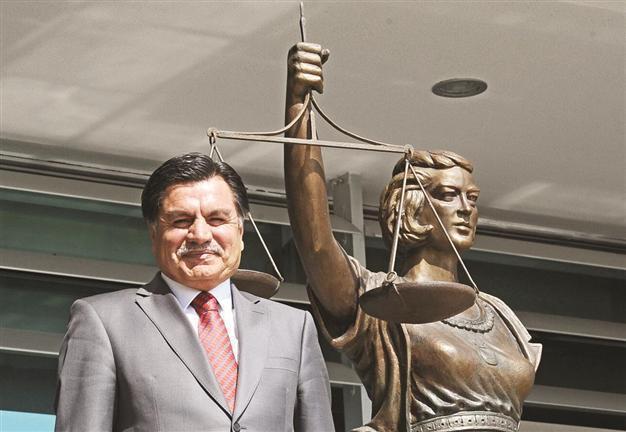Top judge: Changes in judicial futile
Emine Kart ANKARA - Hürriyet Daily News

Constutitonal Court chief Haşim Kılıç poses for photographers at the headquarters of the top court in the capital of Ankara. Daily News Photo
In a move aimed at decreasing the huge number of applications lodged against Turkey at the European Court of Human Rights (ECHR), individual access to the Turkish Constitutional Court will begin on Sept. 23.However, despite voicing enthusiasm over the new mechanism, Constitutional Court President Haşim Kılıç made it clear onSept. 21 that the new mechanism would be useless unless Parliament and the government took the necessary steps to eliminate the problem of lengthy detention and trial periods.
Kılıç, speaking with a group of journalists at a breakfast meeting, was bold in his remarks and critical of the way judicial discretion has been used in many cases.
“In my opinion, if Article 90 had been implemented after 2004, today there would be no need to open individual access,” Kılıç said, urging judges to take pains to implement Article 90 of the constitution, which covers the ratification of international treaties.
In 2004, as part of the EU membership process reforms, the following provision was added to the final paragraph of Article 90 of the Constitution: “In the area of fundamental rights and freedoms, in the event of a conflict between international agreements and domestic laws due to differences in provisions on the same matter, the provisions of international agreements shall prevail.” The article thus gives precedence to the provisions of the ECHR related to fundamental rights and freedoms.
Full functioning system
“If all parts of the judiciary, which is a whole, function successfully, then we can be successful too. Think of this as an engine. If there is an obstruction in some part of the engine, this will influence the whole engine. So, I say with great sincerity that the chance of success for individual access is very low so long as we do not resolve through legal arrangements the current pending cases that have gone to the ECHR and the issue of lengthy periods of detention and trial.”
According to figures announced by Justice Minister Sadullah Ergin, as of March 1, there were nearly 3,000 cases filed in the Strasbourg-based top court in relation to long detention and trial periods in Turkey. This number was expected to exceed 3,500 by Sept. 23, 2012.
If the ECHR eventually maintains that the new mechanism is providing effective auditing, it will not accept applications lodged against Turkey, Kılıç said.
“A two-year long period is outlined. It has been stated that this period is considered a surveillance period. That’s to say, the direct application mechanism is almost closed now until 2014.”
Civilians working inside military institutions will no longer be tried at military courts thanks to a ruling by the to court, Kılıç also said.
On Sept. 20 the Constitutional Court reviewed an appeal by the CHP that asked for the annulment and execution of the new education system, dubbed “4+4+4,” which extends mandatory schooling to 12 years, divided into three levels. The court unanimously ruled the related law is constitutional, Kılıç said, noting that debates surrounding the new system were actually about its implementation.
















